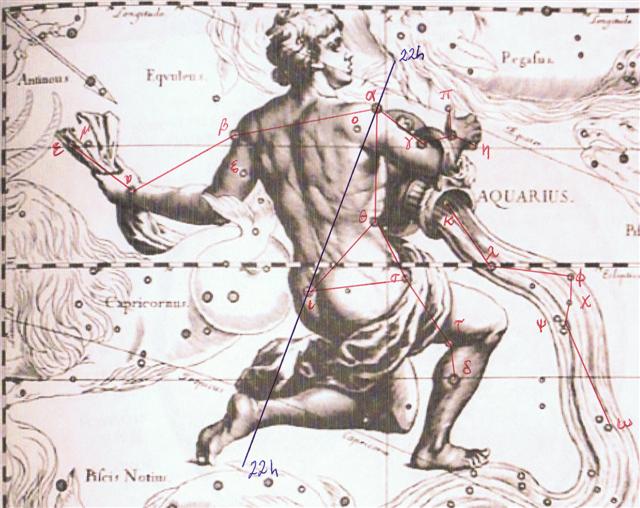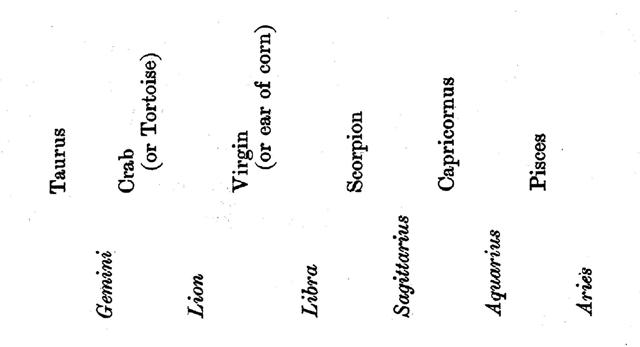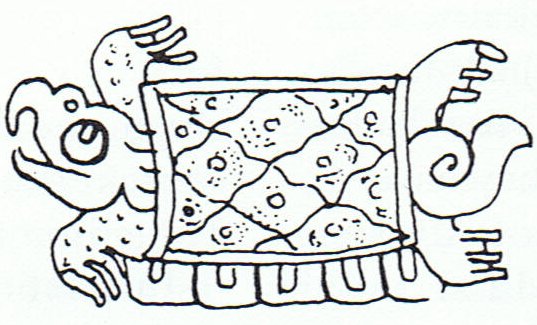The
Donkey
pair was
half a
year
away
from
Dhanistha
and
also
from Albali (ε,
the
first
star in
Aquarius)
- which
in
rongorongo
times
happened
to rise
with the
Sun 314
days
after
March 21:

In
the time
of Al
Sharatain
the
Dhanistha
lunar
station
could
have marked
where
the Old
year
ended.
Or we
could
say it
may have marked
the end
of the
halfyear
beginning
in
Praesaepe:
 |
 |
 |
 |
|
Ga3-6 |
Ga3-7 |
Ga3-8 |
Ga3-9 (68) |
|
Āshleshā-9 /
Willow-24 |
Al Nathrah-6 |
Extended Net-26a |
ι
Cancri (132.0),
ρ Hydrae
(132.4) |
|
π¹
Ursa Majoris,
δ HYDRAE (129.6),
Al Minhar al
Shujā,
Museida (129.9) |
BEEHIVE
and
M44
(130.4),
Xestus (130.5),
Ascellus Borealis
(130.9) |
η Hydrae
(131.0),
Ascellus
Australis
(131.4), Koo She (131.6),
ε HYDRAE
(131.9) |
|
July 28 |
29 (*130) |
30 |
31 (212) |
|
ºJuly
24 (*125) |
25 |
26 |
27 (208) |
|
'July 1 |
2 |
3 (*104) |
4 (185) |
|
"June 17
(168) |
18 |
19 |
20 (*91) |
|
Rotanev, ι
Delphini (312.3), τ Capricorni (312.6), κ Delphini (312.7),
SVALOCIN, υ Capricorni, υ Pavonis
(312.8) |
Deneb Cygni (313.5), β Pavonis (313.6),
δ Delphini (313.8) |
Al Sa’d al Bula'-21 /
Dhanishta-24 /
Girl-10 |
Baten Algiedi (315.8) |
| Yue
(314.3), Gienah Cygni, η Cephei (314.5), γ
Delphini (314.6), σ Pavonis (314.7),
ALBALI (314.8)
Betelgeuze
|
|
January
27 (392) |
28 |
29 (*314) |
30 |
|
ºJanuary
23 |
24 |
25
(*310) |
26 |
|
'December 31
(*285) |
'January
1 (366) |
2 |
3 |
|
"December 17 |
18 |
19 (*273) |
20 (354) |
The
glyphs
above,
however,
do not describe
and
ending
but
rather a new
beginning,
because
we can
see
signs of
manu
rere
(spirit-breaths)
and of
'flower
buds'
ahead -
like
fists
(with no
'petals' as yet
counted).
By the
way, Pollux
was a
pugilist.

...
Let
the
spirit
of
the
man
be
gathered
to
the
world
of
being,
the
world
of
light.
/
Then
see.
Placed
in
the
body
is
the
flying
bird,
the
spirit-breath.
/
Then
breathe!
/
Sneeze,
living
spirit,
to
the
world
of
being,
the
world
of
light.
/
Then
see.
Placed
in
the
body
is
the
flying
bird,
the
breath.
/ Be
breathing
then,
great
Tu.
Now
live!
There
are only
24
glyphs
in line
Ga3 -
probably
meant to
be a Sign,
and a
Turtle
(honu)
was
perhaps
close to
the Full
Moon in
Gregorian
night
314:.
Acubens
is
α
Cancri:
 |
 |
 |
 |
|
Ga3-10 |
Ga3-11 |
Ga3-12 |
Ga3-13 (72) |
|
no
star listed |
ζ
Hydrae (134.1), ρ Cancri (134.2), ο Cancri (134.6) |
Acubens,
Talitha Borealis (135.0),
σ Cancri (135.2), ρ Ursa Majoris (135.6) |
ν Cancri (136.0),Talitha Australis (136.1), ωHydrae (136.8) |
|
August 1 |
2 (580 - 80 = 500) |
3 (215) |
4 (*136) |
|
ºJuly
28 |
29 (210) |
30 |
31 (*132) |
|
'July 5 (186) |
6 (553 - 80 = 473) |
7 (*108) |
8 |
|
Solstice
(*92) |
"June 22 (173) |
23 |
St John's Eve |
|
μ Aquarii
(316.0) |
ε Equulei (317.8) |
no star listed (318) |
21h (319.6) |
| Armus
(319.0), Dorsum (319.3), Tsoo (319.7) |
|
January 31 |
February 1 (32) |
2 (*318) |
3 (399) |
|
ºJanuary
27 (392) |
28 |
29 (*314) |
30 |
|
'January 4 |
5 (*290) |
6 |
7 (372) |
|
Solstice (*275) |
"December 22 |
23 (357) |
Christmas Eve |
 |
 |
 |
|
Ga3-14 (73) |
Ga3-15 |
Ga3-16 |
|
9h (137.0) |
no star listed (138) |
π Cancri (139.2), Miaplacidus (139.3),
Tureis (139.8) |
|
σ¹ Ursa Majoris (137.0),
κ Cancri (137.3), τ Cancri (137.4), Alsuhail (137.5), σ²
Ursa Majoris (137.6), τ Ursa Majoris (137.7),
ξ Cancri
(137.8) |
|
August 5 (*137) |
6 (584) |
7 (219) |
|
ºAugust
1 |
2 (214) |
3 (*135) |
|
'July 9 |
10 (*111) |
11 (192) |
|
"June 25 (*96) |
26 (177) |
27 |
| χ
Capricorni (320.0), ν Aquarii (320.3),
γ Equulei (320.6), ο Pavonis (320.8) |
δ
Equulei (321.7), φ Capricorni (321.8) |
Kitalpha (322.0), Alderamin (322.9) |
|
February 4 (400) |
5 (36) |
6 (*322) |
|
ºJanuary
31 (396) |
ºFebruary
1 (32) |
2 |
|
'January
8 (373) |
9 |
10 (*295) |
|
"December 25 |
26 (360) |
27 (*281) |
In rongorongo times Ga3-14 coincided with 9h. Here ξ Cancri should rise with the Sun. The 7th Arab manzil Al Tarf (The End) was ruled by the stars ξ Cancri and λ Leonis (Alterf), which latter star came 143.4 days after 0h, i.e. in RA day 143 (August 11).
| Egyptian djed |
 |
Phoenician sāmekh |
 |
Greek xi |
Ξ (ξ) |
|
... In rongorongo times the last Greek lettered star in Orion (ξ) rose with the Sun in June 21. The letter seems to have originated from the Phoenician letter samekh (tent peg, supporting prop), which in turn may have been derived from the ancient Egytian djed column ... |
In
ancient
Babylonia
there
evidently
was a
Turtle (Tortoise)
where
Cancer
should
be:

... Let us suppose that what happened in the case of Aries and Libra happened with six constellations out of the twelve: in other words, that the original zodiac consisted only of six constellations.
The upper list not only classifies in an unbroken manner the Fish-Man, the Goat-Fish, the Scorpion-Man, and Marduk of the Babyloniana, but we pick up all or nearly all of the ecliptic stars or constellations met with in early Egyptian mythology, Apis, The Tortoise¹, Min, Serk-t, Chnemu, as represented by appropriate symbols.'
¹I think I am right about the Tortoise, for I find the following passage in Jensen, p. 65, where he notes the absence of the Crab: ‘Ganz absehend davon, ob dasselbe für unsere Frage von Wichtigkeit werden wird oder nicht, muss ich daran erinnern, das unter den Emblemen, welche die sogenannten 'Deeds of Salè' häufig begleiten, verschiedene Male wie der Scorpion so die Schildkröte abgebildet gefunden wird’.
|


"In
Polynesia
the
tortoise
personified
the
war
god
Tu.
Drawing
tattoo
marks
of a
tortoise
was
a
custom
among
warriors.
In a
story
from
Admiralty
Island,
people
are
born
from
eggs
laid
by
the
World
Turtle.
There
are
many
similar
creation
stories
throughout
Polynesia."
(Wikipedia)
|










